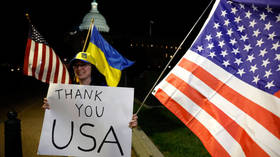Welcome to the post-Covid future: Face masks, elbow bumps, and the end of freedom

The question as to what our future will look like post-Covid is becoming a frightful thing to contemplate. And this goes beyond health fears. Will humanity emerge from the current emergency with its honorable customs intact?
Dr David Nabarro, a professor at Imperial College London and special envoy to the World Health Organization (WHO), has made a startling announcement: There is no guarantee that a vaccine against the coronavirus will “appear at all,” he said, and even if it does, it may not pass all the “tests of efficacy and safety.” That comment should give us more than just pause; it should give us outright alarm.
Currently, there are highly influential individuals, not least of all Microsoft co-founder Bill Gates, who argue that we’ll only get back to some semblance of normalcy when everyone has had their vaccine shot. Gates – who is heavily invested in pharmaceutical companies – went so far as to say that “mass gatherings,” which could mean anything from a funeral to a football match, may not return “at all” without a universal vaccine. Now we're being duly informed that such a day may never arrive.
Before we convert our homes into bunkers and our communities into no-go zones, we desperately need a Plan B. There is no way we can continue proclaiming, at least with a straight face, that we’re members of a healthy and robust society if, at the same time, we’re forced to endure endless lockdowns and quarantines behind surgical masks. Although some short-term social distancing may be a reasonable method of defeating Covid-19, such a strategy cannot last forever.
In defense of custom and common sense
In mankind’s past battles against a long line of enemies, an unspoken rule took precedence, which is that people continued with their regular customs and traditions for as long as humanly possible. To halt the normal flow of life when confronted by an adversary was considered an admission of defeat. In our present fight against an invisible virus, however, the old rules of engagement have been rewritten. Unity and solidarity are no longer looked upon as invaluable assets; in fact, they’ve become potentially deadly liabilities. We would be foolish to think this attitude, borne out of understandable fear, will not have long-term repercussions.
Already there is evidence of great social and cultural upheaval in the air, and not of the positive sort. A recent survey by YouGov reported that 31 percent of Americans will no longer honor the ancient tradition of shaking hands, even after the COVID-19 pandemic subsides, while 26 percent said they were undecided. It looks as though the ‘elbow bump’ or Asian-style bow is here to stay. However, instead of ditching the handshake, that time-honored gesture of trust and integrity (and risking getting shamed for ‘cultural appropriation’ to boot!), why not keep the tradition while maintaining the habit of frequent hand-washing and not touching our face? Surely we don’t have to toss out the proverbial baby with the bath water.
On the question of wearing a mask in public, it looks as though that sad fashion statement, once reserved for the more criminal-minded, will also become a permanent feature of modern living. As Dr Nabarro told the BBC: “Some form of facial protection, I’m sure, is going to become the norm, not least to give people reassurance.”
Personally speaking, the sight of a person wearing a mask gives me absolutely no sense of assurance, but rather a sense of separation, insecurity and general anxiety. But that’s just me. I take my cue from the World Health Organization, which states, “If you are healthy, you only need to wear a mask if you are taking care of a person with COVID-19.”
Meanwhile, to add to the overall feeling of anxiety now permeating society, there are people who are actively snitching on the rule breakers. Incredibly, this is happening at the encouragement of certain political leaders, as witnessed in Los Angeles, New York City and elsewhere. That is a regrettable throwback to more authoritarian times that have no place in modern democracies. The goals of our leaders should be to encourage an atmosphere of trust, rather than promoting fear and paranoia during times of crisis. Why not encourage citizens instead to report those individuals who are in dire financial straits and in desperate need of assistance? Or maybe reward those citizens who donate their time and money to charities with a tax rebate?
Also on rt.com ‘Beach wars’ heat up as ‘arbitrary’ rules gall stir-crazy Americans determined to enjoy early summerThese seemingly insignificant steps are critical now that humanity is gazing into the great unknown – a future that seems utterly beyond our control. Every aspect of our lives that we once took for granted has been demolished overnight. And now it seems millions of people, angry and frustrated at their circumstances, are starting to reject lockdown orders. And, as to be expected, there is an app to gauge that.
According to Apple’s Mobility Trends, which monitors the movement of iPhone users, people in the US, Italy, Germany and the UK began to deviate from stay-at-home orders around mid-April. Although still far below pre-coronavirus levels, it suggests the herd is getting restless.
“People are feeling the itch to get back to the real world,” the payments company Foursquare said in a blog post.
Anybody who doubts that assertion needs only consider the spate of protests that have been growing in the US. Last week, hundreds of demonstrators, some armed with assault-style rifles, converged at Michigan’s state capitol in Lansing to protest the government’s request to extend emergency powers. On the West Coast, Californians are demanding access to their public beaches. It is not hard to imagine such demonstrations rolling across the country in a sudden explosion of anger mixed with desperation.
'GOVERNOR, OPEN OUR ECONOMY ON MAY 1 AND RESPECT OUR RIGHTS AND FREEDOMS.'Wild scene in Lansing, Michigan as hundreds of people protest the state's stay-at-home order.Team coverage from @WOODTV's @_HeatherWalker and @LeonHendrix. pic.twitter.com/CySg9Y6Nx8
— Austin Kellerman (@AustinKellerman) April 15, 2020
So, what is the solution, especially if the much-hyped ‘second wave’ of Covid-19 makes landfall? First, it’s necessary to understand what we can no longer do, unless we want civil strife. Although some form of social-distancing rules can be established, it’ll be only a matter of time before people will refuse to stay indoors, regardless of the risks. The same goes for businesses. There will naturally come a time when the majority will come to the conclusion that they would rather take their chances against a lethal virus on the streets than sit at home and starve.
At that time, the sick and elderly can quarantine themselves until the worst has passed, while the young and healthy can get on with the task of making a living and keeping the global economy from capsizing, albeit it in a safe and sensible way. There doesn’t seem to be any other way, unless a miracle vaccine or drug is available tomorrow.
Think your friends would be interested? Share this story!
The statements, views and opinions expressed in this column are solely those of the author and do not necessarily represent those of RT.

















